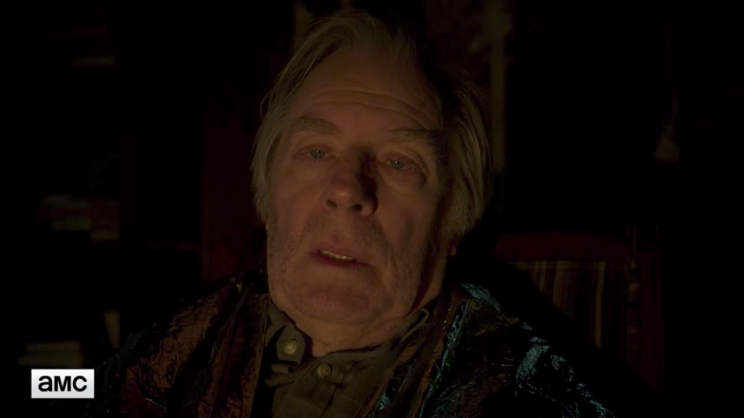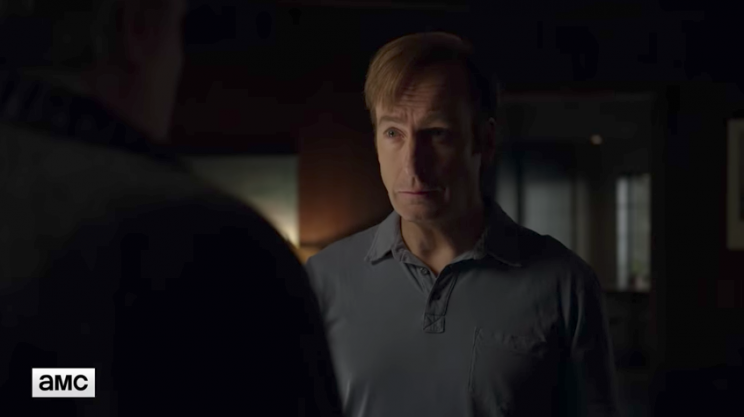‘Better Call Saul’ Season Finale: Michael McKean on (Literally) Burning Down the House

Warning: This interview for the “Lantern,” Season 3 finale episode of Better Call Saul contains spoilers.
No one’s officially calling it a death in the McGill family, but that final shot in Monday’s Better Call Saul Season 3 finale sure doesn’t leave us with a lot of hope for Chuck McGill’s survival into Season 4. Yahoo TV talked to the Emmy-worthy Michael McKean about how and why Chuck’s showdown with Howard went so wrong, filming his epic meltdown and destruction of Chuck’s home, and the little pills that might have had a role in Chuck making such a tragic decision about his future. (Update: Read our postmortem interview with Saul EPs Vince Gilligan and Peter Gould here.)
When Chuck is sitting at that HHM conference room table, and he proposes what he calls the third option to Howard — that they shake hands and put the feud behind them — he seems 100 percent certain Howard’s going to take him up on that.
Yeah, I suppose. Listen, the whole ending here is still difficult to talk about. Two reasons: one, I haven’t seen the episode, and two, it’s so complicated that every moment becomes about all moments. Every talk about particulars of this character and of his adventures on Better Call Saul, it’s hopefully of a piece… You start breaking it down: When did he start thinking about committing suicide? I don’t know that he ever really did until… I don’t even know whether there’s an “until” there. It just seemed to, and I think it’s thanks to the writing, it seemed to dovetail with everything else about him. As you see, the final moment is more about inaction than it is about action. You know what I’m saying? I thought that was very good writing, too. It was really, it was very satisfying to play.
Without then getting into the specifics of that opening scene, what does absolutely seem clear is that he is surprised that Howard doesn’t accept his proposal to just forget about everything and move forward. More than that, he’s as hurt as we’ve ever seen him. He expects to be hurt by Jimmy. He doesn’t expect to be hurt by Howard. Is Howard the brother who did live up to his expectations of decorum and accomplishment?
Yeah. I also think that he’s the real … you’ve got two brothers. Neither of them have a child. I think in Chuck’s case, he views Howard as something of a surrogate son. We don’t know the relationship between Hamlin Sr. and Chuck. That was maybe very complex in its own right. We’d have to go back into the ’70’s for that, which would be very interesting. Having said that, I think that’s a never-spoken thing, but I’ve always played it. I’ve always felt it was real. I’ve never even talked to Patrick (Fabian) about it. He may have had the same thing.
Here’s the other thing. You say that’s as hurt as we’ve ever seen Chuck. That’s as hurt as Chuck has ever let us see. Chuck’s hurt is… it approaches the infinite. He just doesn’t want us to see it.

I don’t think the audience believes Chuck when he tells Jimmy that he never cared much about him. Chuck’s actions afterwards certainly support that he didn’t mean it. After Howard cast him out personally and professionally and publicly, did Chuck decide to use that to push Jimmy away? Was Howard’s dismissal of Chuck a signal to Chuck to stop trying? To stop trying to get better? To stop trying to live?
I’m not sure I would say so. Then again, I’m only viewing it through what Chuck knows about himself. We can watch a show and say, “Hey, he knows this and he knows that.” No, a lot of times they should know it, but they don’t. Chuck’s self-awareness — this is the unexamined life that ain’t worth living. Really. His self-awareness is completely uncritical and subjective. If a guy fancies himself a master of the universe and suddenly the universe is sitting on him and he can’t get up, things change.
His meltdown in his house is crushing and heartbreaking and exhausting. What was the process of filming that like?
I think it was one full day inside in our soundstage, and one almost full day on the location for the meters, the stuff with the meter. The house, which was the location, we were saying goodbye to that. It’s in the family, though. The family whose house that is, there’s a guy who works on the show who is related to them. It was a lovely place to shoot, but so was our soundstage.
When Chuck’s sitting in the chair, and he’s kicking at the desk that holds the lantern, he’s doing it very slowly and deliberately, but he’s also doing it slowly enough that he could stop it at any time, and the lantern won’t topple over and set the house on fire. Do you feel like he was hoping there might be a knock at the door? That something might interrupt him?
No, I don’t think he expected anything. I think he was alone in the world. I tried to make sure that the pill bottles were in the shot occasionally, so that there was at least a suggestion of a man who’s maybe doing too much of this stuff that gives him a flat line. It feels so much better than the agitation. I can’t communicate what Chuck was feeling at that time, because I think at that time, Chuck was in a very strange place. I know Michael was.
What can you, or what will you say about Chuck’s future? Do you feel like we were left with a cliffhanger, or do you feel like there’s a clear answer there?
I think that’s a question for [Saul co-creators] Vince [Gilligan] and Peter [Gould].
What was your favorite part of Season 3 for Chuck?
Let me tell you, first of all, that one of my favorite things about this season has nothing to do with Chuck. It’s that Gus is back. I just like watching Giancarlo Esposito. He’s just a fascinating actor to me. I like to think of this as this big, long movie I did. I tried to get every moment that I could get. I tried to make everything make sense. Even though when you watch Chuck, you’re not watching anything that’s easy. He’s a difficult man. He’s a little erratic, I think you could say, from the outside. That was my main job: to make it a believable person. I’ve just got to say that the best moment for me was the 30-hour movie we made.
Can you say anything about the future going forward for Chuck?
No. Like I say, it’s really for other people (to comment on).
Are there things that you still want to do with the character?
I want to do anything they think that they’d like to see me do. I’m not being evasive. That really is the truth.
Read more from Yahoo TV:

